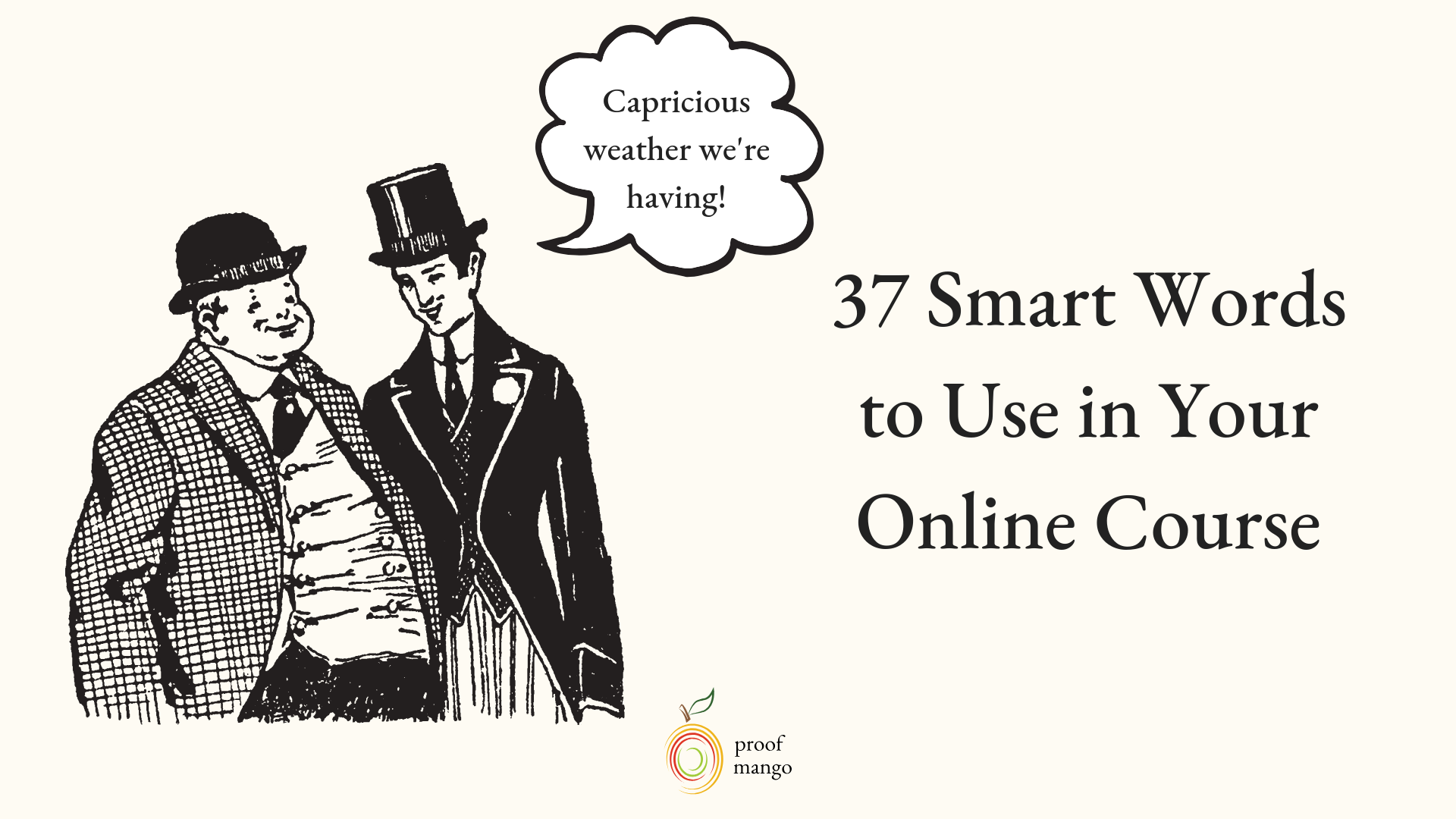Have you ever used the wrong word to describe something and felt instantly humiliated?
It’s embarrassing.
Especially in an online course you’re teaching.
And unfortunately, using the wrong words can be costly to your credibility as an online teacher.
Especially if you’re using big words or phrases to sound smart, and they come out wrong.
For example:
“It is, for all intensive purposes, the best way to use this tool.”
Saying this in your course equals death to your authority, because “for all intensive purposes” isn’t an actual phrase. It’s one that commonly gets confused with “for all intents and purposes.”
The correct way to say this would be:
“It is, for all intents and purposes, the best way to use this tool.”
It’s okay to use big words or phrases that make you sound smart, as long as you use them correctly.
That’s why we’ve compiled a huge list of smart words to use in your online course. We know you’re smart — and we want you to sound that way!
But for most people with English as a second language, this is especially tough.
Our goal with this list is to help you use better words with confidence in your course. This list will help you understand what each “smart” word means and how to use it correctly.
For each word, we listed both the definition and three example sentences for each one. That way you know exactly how to use each word in the context of your course.
We’ve also included links to pronunciation videos for each of these words, so you can pronounce them correctly, too.
Let’s go!
Where to Use Smart Words in Your Online Course
Before we dive in, let’s quickly talk about where to use these “smart” words in your online course.
If you’re trying to sound like a smarter instructor, use these words in your videos. It gives you an opportunity to sound and look confident on camera.
Anna English has a great video on how to sound confident when speaking English if you’re a non-native English speaker.
You can also use these words in your resource material (worksheets, PDFs, etc.).
I wouldn’t necessarily include big words in your slide deck presentations, though, because that copy should be simple and short. But you could always use them in your audio during your presentation, without including them in your slide deck copy.
That being said, read on for some impressive words to use in your course to help you sound a little bit smarter and more authoritative to your students.
#1 Advantageous
Definition: favorable, giving an advantage
Pronunciation: \ˌad-ˌvan-ˈtā-jəs
Use instead of: “helpful” or “beneficial”
Example sentences in your course:
“Your experience with Excel puts you in an advantageous position in this course.”
“Using my Smart Funnel system is advantageous for beginners who still don’t understand how funnels work.”
“It might be more advantageous to pre-sell your course to a small group of people, so you know what to improve later on.”
Hear it: Click here to hear this word pronounced.
#2 Anomaly
Definition: something different, peculiar, or not easily classified: an irregularity
Pronunciation: \ə-ˈnä-mə-lē
Use instead of: “not normal” or “not usual”
Example sentences in your course:
“If you don’t get any clicks on your ad after setting it up, it’s not an anomaly — it’s because your strategy needs work.”
“If you can’t detect the anomaly in this graph, you need to revisit Lesson 2.”
“Becoming wildly successful on your first webinar is an anomaly — most people don’t hit their stride until their fifth or sixth webinar.”
Hear it: Click here to hear this word pronounced.
To have more fun with this word, and to hear it more, listen to Anna Molly by Incubus. I couldn’t stop singing this song while writing this part of the post. 🙂
#3 Antidote
Definition: something that relieves, prevents, or counteracts
Pronunciation: \ˈan-ti-ˌdōt
Use instead of: “cure” or “a way to fix”
Example sentences in your course:
“If you’re struggling with writing sentences in English, creating sentence diagrams is a great antidote.”
“Meditation is a great antidote to depression and anxiety.”
“There’s no quick antidote to failing ad sales — you need to test and then test again.”
Hear it: Click here to hear this word pronounced.
#4 Avant-garde
Definition: intellectuals who form an artistic, social, or political vanguard or elite
Pronunciation: \ˌä-ˌvän(t)-ˈgärd
Use instead of: “high-level” or “cutting-edge” or “state-of-the-art”
Example sentences in your course:
“Here’s an example of a website that could be called avant-garde, given the way it’s designed.”
“In this lesson, I’m going to discuss how you can create a truly avant-garde fashion line.”
“If you want to develop a more avant-garde style of writing, start by studying experimental literature.”
Hear it: Click here to hear this word pronounced.
#5 Bona fide
Definition: made with earnest intent: sincere, genuine
Pronunciation: \ˈbō-nə-ˌfīd
Use instead of: “legit” or “real”
Example sentences in your course:
“I’m going to teach you how to establish yourself as a bona fide Pinterest expert.”
“You’ll want to read Dot Com Secrets by Russell Brunson — it’s a bona fide resource for anyone wanting to learn more about digital marketing.”
“You’ll be a bona fide email marketer by the end of this course.”
Hear it: Click here to hear this word pronounced.
#6 Camaraderie
Definition: a spirit of friendly good-fellowship
Pronunciation: \ˌkäm-ˈrä-d(ə-)rē
Use instead of: “community” or “companionship”
Example sentences in your course:
“Use the course Facebook group as a way to build camaraderie with other students.”
“Join us on our coaching call this week and enjoy the camaraderie we’ve built with students from around the world.”
“My goal with this course is to help you create a sense of camaraderie in your Facebook groups so you can form trust with your members.”
Hear it: Click here to hear this word pronounced.
#7 Capricious
Definition: impulsive, unpredictable
Pronunciation: \kə-ˈpri-shəs
Use instead of: “unpredictable” or “changes a lot” or “inconsistent”
Example sentences in your course:
“It’s best not to take a capricious approach to your online business — chart a course for yourself and follow that path until you start seeing results.”
“If you’ve been known to be capricious with your spending, that all stops now — this course will teach you about responsible spending habits.”
“You’ll learn how to stay away from men who are capricious — they’ll say one thing one day, and something different the next.”
Hear it: Click here to hear this word pronounced.
#8 Caution
Definition: to advise or warn: a warning (this is one definition – see others)
Pronunciation: \ˈkȯ-shən
Use instead of: “warn” or “advise”
Example sentences in your course:
“I would caution you against using dating apps when trying to find your ideal man.”
“I say this as a caution, as some students have told me that combining these two elements can get messy.”
“Most marketers caution against buying traffic until you’re seeing conversions.”
Hear it: Click here to hear this word pronounced.
#9 Comprehensive
Definition: inclusive, covering completely
Pronunciation: \ˌkäm-pri-ˈhen(t)-siv
Use instead of: “includes everything” or “all-inclusive”
Example sentences in your online course:
“This course provides a comprehensive view of how to be successful with Facebook Ads.”
“You’ll find a comprehensive list of nouns and adverbs in the Downloads section of this course.”
“Unlike other digital marketing course instructors out there, my approach is comprehensive — no topic is left uncovered.”
Hear it: Click here to hear this word pronounced.
#10 Egregious
Definition: conspicuously bad, flagrant
Pronunciation: \i-ˈgrē-jəs
Use instead of: “really bad” or “super bad”
Example sentences in your course:
“One of the more egregious errors I’ve seen in grammar is adding apostrophes where they’re not needed.”
“This paragraph is an egregious example of writing for your target audience.”
“Please let me know if you see any egregious errors in this example.”
Hear it: Click here to hear this word pronounced.
#11 Erroneous
Definition: containing or characterized by error: mistaken
Pronunciation: \i-ˈrō-nē-əs
Use instead of: “incorrect” or “wrong”
Example sentences in your course:
“Most people make erroneous assumptions when they get to this part of the homework.”
“You’ll want to double check for skewed or erroneous data.”
“Share your results, however erroneous, with the Facebook group.”
Hear it: Click here to hear this word pronounced.
#12 Esoteric
Definition: exhibiting knowledge restricted to a small group
Pronunciation: \ˌe-sə-ˈter-ik
Use instead of: “hard to understand” or “something only a few people understand”
Example sentences in your course:
“The research on this subject is so esoteric, only a few scientists really understand it.”
“I’m really good at Algebra, but I’ve always found Trigonometry to be more of an esoteric subject best left to mathematicians.”
“I’m well-versed in esoteric literature from the Middle Ages.”
Hear it: Click here to hear this word pronounced.
#13 Euphemism
Definition: the substitution of an agreeable expression for one that may offend
Pronunciation: \ˈyü-fə-ˌmi-zəm
Use instead of: “a better way of saying” or “a nice way of saying”
Example sentences in your course:
“The best way to describe sex to your children is to use a euphemism, so as not to shock them.”
“The term ‘downsizing’ is really just a euphemism for being laid off.”
“A certified pre-owned car is just a euphemism for a used car.”
Hear it: Click here to hear this word pronounced.
#14 Facet
Definition: any of the definable aspects that make up a subject or an object
Pronunciation: \ˈfa-sət
Use instead of: “aspect” or “one part of”
Example sentences in your course:
“Each facet of the problem requires equal attention.”
“It’s important to learn the different facets of our culture.”
“This lesson is just one facet of a larger industry.”
Hear it: Click here to hear this word pronounced.
#15 Fastidious
Definition: showing or demanding excessive delicacy or care (this is one definition – see others)
Pronunciation: \fa-ˈsti-dē-əs
Use instead of: “overly attentive”
Example sentences in your course:
“Virgos are known to be excessively tidy and fastidious about everything.”
“To be a great copyeditor, you have to have a fastidious eye.”
“Personally, I can be very fastidious about the way text is aligned on a page.”
Hear it: Click here to hear this word pronounced.
#16 Faux pas
Definition: a blunder, especially a social one
Pronunciation: \ˈfō-ˌpä
Use instead of: “a no-no” or “a mistake in the eyes of society”
Example sentences in your course:
“I would consider self-promotion a faux pas in this Facebook group, since it should only be used for connecting and asking for help.”
“Follow these nighttime makeup tips to avoid a makeup faux pas when you go out at night.”
“You should not be making this type of faux pas in public by the time you finish this course.”
Hear it: Click here to hear this word pronounced.
#17 Finagle
Definition: to obtain by trickery
Pronunciation: \fə-ˈnā-gəl
Use instead of: “persuade by tricking” or “manipulate”
Example sentences in your course:
“Sometimes you can finagle your way into an influencer’s circle, but if he or she doesn’t really know you, you won’t stand to benefit from the relationship.”
“Don’t attempt to finagle with the formula in order to produce a different result.”
“All of those other people will try to finagle money out of you — don’t give in.”
Hear it: Click here to hear this word pronounced.
#18 Freudian slip
Definition: a slip of the tongue that reveals some unconscious part of the mind
Pronunciation: \ˈfrȯi-dē-ən \ˈslip
Use instead of: “a slip of the tongue”
Example sentences in your course:
“Perhaps it was a Freudian slip that I said ‘macaroni’ instead of ‘macros’ in that last example.”
“One of my favorite Freudian slips was when my friend Jack said, ‘I look forward to hearing from you shorty’ instead of ‘shortly’ to the shortest guy on our block.”
“Politicians have given us the best examples of Freudian slips — I’ll never forget when president Bush said, ‘We have had some sex…uh, setbacks.’”
Hear it: Click here to hear this word pronounced.
#19 Infinitesimal
Definition: immeasurably small
Pronunciation: \(ˌ)in-ˌfi-nə-ˈte-sə-məl
Use instead of: “really small”
Example sentences in your course:
“When making the dressing, you’ll only want to add a small amount of salt — literally, an infinitesimal amount. Trust me, it will go a long way.”
“Even the most infinitesimal mistake can mess up an entire piece of code.”
“You’ll notice a change in your mindset after this lesson. The change might seem infinitesimal at first, but it’s a step in the right direction.”
Hear it: Click here to hear this word pronounced.
#20 Litany
Definition: a sizeable series or set (this is one definition: see others)
Pronunciation: \ˈli-tə-nē
Use instead of: “a bunch of”
Example sentences in your course:
“If you don’t structure your drawings this way, you’ll run into a litany of problems.”
“When I started out in this industry, I experienced a litany of failures.”
“This book has a litany of positive reviews, because it’s so well-crafted.”
Hear it: Click here to hear this word pronounced.
#21 Misnomer
Definition: use of a wrong or inappropriate name
Pronunciation: \ˌmis-ˈnō-mər
Use instead of: “wrong way of saying” or “incorrect way to describe”
Example sentences in your course:
“The name ‘Greenland’ is a misnomer — the country is mostly covered in ice.”
“Don’t give your screenplay a happy title before you’ve finished writing it. It could end up being an incredibly sad screenplay, and your title would be a complete misnomer.”
“Slack is a great messaging tool, but it’s a bit of a misnomer, isn’t it? I’m never slacking off when I work in there!”
Hear it: Click here to hear this word pronounced.
#22 Myriad
Definition: a great number
Pronunciation: \ˈmir-ē-əd
Use instead of: “a ton of” or “a lot of”
Example sentences in your course:
“This lesson covers a myriad of topics on sketching.”
“There’s a myriad of social media gurus out there, but don’t listen to all of them.”
“There’s a myriad of ways to look at this.”
Hear it: Click here to hear this word pronounced.
#23 Nefarious
Definition: flagrantly wicked or impious: evil
Pronunciation: \ni-ˈfer-ē-əs
Use instead of: “evil” or “up to no good”
Example sentences in your course:
“I get the feeling the author of this book is slightly nefarious.”
“A lot of nefarious companies will try to sell you on a tool you don’t need.”
“Whatever you do, don’t use this tactic for nefarious purposes — I created it only for good.”
Hear it: Click here to hear this word pronounced.
#24 Non sequitur
Definition: a statement that does not follow logically from something previously said
Pronunciation: \ˌnän-ˈse-kwə-tər
Use instead of: “inconsistent” or “does not follow”
Example sentences in your course:
“If, at the beginning of your book, you say that french fries are healthy, but then throw in a non sequitur later about fries being bad for you, you’ll confuse your readers.”
“I’ll teach you how to spot a non sequitur in your debates.”
“It’s a non sequitur — just because this experiment produced one result, doesn’t mean it will produce another.”
Hear it: Click here to hear this word pronounced.
#25 Obfuscate
Definition: to throw into shadow: darken
Pronunciation: \ˈäb-fə-ˌskāt;
Use instead of: “hide” or “cloud” or “confuse”
Example sentences in your course:
“You can be criticized for using arguments that obfuscate the main issue.”
“Loan contracts are filled with words that are meant to obfuscate trusting borrowers.”
“If you want people to enjoy your writing, keep it simple and don’t obfuscate what you’re trying to say.”
Hear it: Click here to hear this word pronounced.
#26 Obtuse
Definition: insensitive, lacking intellect (this is one definition – see others)
Pronunciation: \äb-ˈtüs
Use instead of: “dim-witted” or “dumb”
Example sentences in your course:
“Only the most obtuse would miss the main point of this passage.”
“Ignore any rude or obtuse comments you get on your videos — they will only distract you.”
“When you open yourself up to spirit, you’ll find yourself being able to love even the most obtuse people.”
Hear it: Click here to hear this word pronounced.
#27 Perfunctory
Definition: routine, mechanical
Pronunciation: \pər-ˈfəŋ(k)-t(ə-)rē
Use instead of: “routine”
Example sentences in your course:
“This task can feel a bit perfunctory at times, but it’s crucial to your success.”
“You don’t want to give a perfunctory performance — you want to give a stellar performance.”
“The test will be practical, perfunctory, and often will include multiple-choice questions.”
Hear it: Click here to hear this word pronounced.
#28 Plethora
Definition: an abundance or profusion
Pronunciation: \ˈple-thə-rə
Use instead of: “a bunch of”
Example sentences in your course:
“There are a plethora of social media tools out there.”
“I’ve read a plethora of books on sales funnels and digital marketing.”
“This book has a plethora of helpful illustrations.”
Hear it: Click here to hear this word pronounced.
#29 Quintessential
Definition: perfectly typical or representative of a particular person or thing
Pronunciation: \ˌkwin-tə-ˈsen(t)-shəl
Use instead of: “typical”
Example sentences in your course:
“If you want to study this film style, I’d suggest watching Halloween — it is the quintessential horror movie.”
“Back in the old days, young men on bikes were the quintessential means of newspaper delivery.”
“This is the quintessential tool to buy if you want to learn how to build a sales funnel.”
Hear it: Click here to hear this word pronounced.
#30 Rapport
Definition: a friendly, harmonious relationship
Pronunciation: \ra-ˈpȯr
Use instead of: “a good relationship”
Example sentences in your course:
“My goal is to build great rapport with my students.”
“You want to respond to all comments left on your blog post, so you can establish a great rapport with your audience.”
“If you’re preparing to ask for a raise, one question to ask is, do you have good rapport with your boss?”
Hear it: Click here to hear this word pronounced.
#31 Rhetoric
Definition: a type or mode of language or speech (this is one definition – see others)
Pronunciation: \ˈre-tə-rik
Use instead of: “flowery speech” or “eloquent way of speaking”
Example sentences in your course:
“I don’t recommend using harsh rhetoric in your speeches.”
“You want to be able to identify the type of rhetoric used in healthy and unhealthy relationships.”
“In this lesson, we’re going to study classical rhetoric and its emotional effects.”
Hear it: Click here to hear this word pronounced.
#32 Scintillating
Definition: brilliantly lively, stimulating, or witty
Pronunciation: \ˈsin-tə-ˌlā-tiŋ
Use instead of: “sparkling” or “animated” or “exciting” or “clever”
Example sentences in your course:
“Don’t expect scintillating conversation from a child of that age.”
“Genetic mutation is far from scintillating, but it’s an important part of this lesson.”
“Unlike most course instructors, it’s my goal to turn you into a scintillating speaker who catches and keeps attention on stage.”
Hear it: Click here to hear this word pronounced.
#33 Stigma
Definition: a mark of shame or discredit (this is one definition – see others)
Pronunciation: \ˈstig-mə
Use instead of: “disgrace” or “shame”
Example sentences in your course:
“Our goal is to remove the stigma around mental health issues.”
“It was common for women in that time period to attempt suicide, rather than live with the stigma of being an unwed mother.”
“The stigma of bankruptcy can follow you for a long time, but we’re out to change that in this course.”
Hear it: Click here to hear this word pronounced.
#34 Superfluous
Definition: exceeding what is sufficient or necessary
Pronunciation: \su̇-ˈpər-flü-əs
Use instead of: “being extra” or “overly necessary”
Example sentences in your course:
“The third paragraph in this essay is superfluous — the points discussed in it were already mentioned.”
“When submitting your cover letter via email, write it in the body of the email. It is superfluous to also add it as an email attachment.”
“Many of you had jobs that were rendered superfluous because of technology, so you flocked to join the internet marketing world.”
Hear it: Click here to hear this word pronounced.
#35 Tenuous
Definition: flimsy, weak
Pronunciation: \ˈten-yə-wəs
Use instead of: “flimsy” or “thin”
Example sentences in your course:
“Today, we’re talking about how to turn a tenuous argument into one that is strong and believable.”
“The evidence supporting this thesis is tenuous.”
“Your odds of converting a buyer with a hastily thrown together landing page are tenuous.”
Hear it: Click here to hear this word pronounced.
#36 Ubiquitous
Definition: existing or being everywhere at the same time: constantly encountered
Pronunciation: \yü-ˈbi-kwə-təs
Use instead of: “widespread” or “everywhere”
Example sentences in your course:
“Not only is shawarma delicious and easy to cook, it’s now ubiquitous on streets in the city.”
“Nowadays, virtual assistants are ubiquitous online, but how do you find the right one?”
“Google ads are high-priced and ubiquitous online — I would try your hand at organic search traffic using SEO tactics.”
Hear it: Click here to hear this word pronounced.
#37 Zealous
Definition: characterized by eagerness and ardent interest in pursuit of something
Pronunciation: \ˈze-ləs
Use instead of: “enthusiastic” or “eager”
Example sentences in your course:
“Don’t be afraid to be overly zealous in your pursuit of the perfect material for this sewing project.”
“I’m going to teach you how to become a zealous email marketer, who goes above and beyond for all clients.”
“I am a zealous supporter of people who find the time to proofread all of their work before submitting it.”
Hear it: Click here to hear this word pronounced.
Summary
Using the wrong words as an online course instructor can be humiliating — and detrimental to your credibility.
I hope with this list you were able to pick and choose a few smart words to use in your online course to help build your authority, and keep students interested in what you have to teach.
What words do you plan on using, if any? Did this list help clear up any confusion you previously had about these words? I’d love to hear your thoughts in the comments!







































